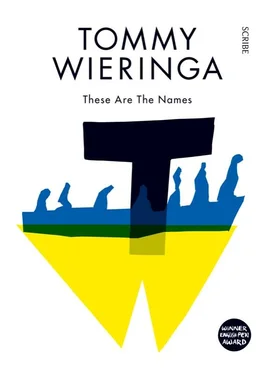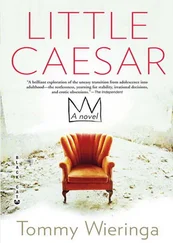‘It’s not like that,’ he says quietly.
‘What’s not like that?’
‘Nothing. Forget it.’
Beg repeats his question, but the boy remains silent.
‘Then you’re staying here,’ Beg says as he gets up. ‘I can’t help you if you don’t cooperate.’
He walks to the window again and stands there, his hands folded behind his back. A pack of glistening snow falls from the branches every now and then. Otherwise the park is devoid of motion. Fresh snow — this is what the world on the seventh day looks like.
Behind him he hears the deep breathing of sleep.
When the monotonous whistling in his ears begins again, he leaves the room and quietly pulls the door closed behind him. The nurse gets up from her chair in the hallway and comes to him on creaking rubber soles. The jangling of her key ring echoes in his ears. She locks the door. Metal against metal, the sound is amplified many times over.
CHAPTER THIRTY-ONE.Remember what Amalek did
‘Do you play chess?’ the rabbi had asked him once; since then they would sometimes play as a distraction from spiritual affairs. The hours with Rabbi Eder were dear to Beg; they constituted his only physical tie with Judaism. They drank black tea from Krasnodar, ate sweet cookies, and thought about the moves to come. The bulbs on the ceiling shed little light, so the difference between the objects and their shadows was hard to see.
The rabbi sacrificed a knight.
He’s just shaking up the board, figured Beg, who had never won from him. One draw, on one occasion — that was all. Now that Beg was in a good position for once, Eder had to go and do something unexpected, like this. Frustrated, he sipped at his tea.
‘A peculiar move,’ he murmured.
‘Then you don’t understand the essence of the game,’ the rabbi said.
After a long silence, Beg asked: ‘And what might that essence be?’
‘The essence consists of leading your opponent into a dark forest, the forest where two plus two is five — and the only path leading out of that forest is broad enough for only one of you. That’s how Grandmaster Tal put it.’
‘Ah-ha, I see.’
He lost that game, too. The rabbi had left the forest, but Beg was still wandering around in it.
They arranged the pieces of the board. ‘You don’t seem to be focusing well,’ the rabbi said. ‘Usually you put up more of a fight.’
Beg told him about the talk he’d had with the woman that afternoon, after he had left the boy. His reconstruction took form slowly.
‘Try to figure it,’ he said. ‘They all pay a huge chunk of money to cross the border. They spend hours hiding in a dark trailer, until they get to the border. Dogs, guards, they’re shitting their pants. When the truck starts rolling again, they feel like screaming in fear and joy. It’s night out, dark, by the time they leave the truck. The driver points them in the direction they need to go, says they’ll find a city out there. Morning comes, they walk and walk but never get to a city. They’re in doubt; they fight. All they see are the steppes, nothing else. The group splits up, a few of them go back, most of them push on. Westward, all the time. But they never get anywhere. There is no civilised world anymore; they’ve ended up in the wilderness. Without water, without food. They have nothing to shield their heads against the sun by day or their bodies against the cold at night. People die. That’s the way the woman put it: one after the other died, and any one of us could have been next. In the end, there are five of them left. They wandered across the flats for months.’
Beg shook his head.
‘They even made it through the winter. It’s a miracle that they survived.’
The memory comes to him of the woman, describing the journey in a feeble voice, monotonous as the steppes themselves. Her pregnant belly was heaving beneath the blanket, a hideous deformity on her emaciated body. When he’d asked who the father was, she hadn’t answered. She remained stubbornly silent when it came to the black man’s head. That he had been with the group from the start, that was all she would say.
‘I don’t understand,’ the rabbi said. ‘They crossed the border, that’s what you said.’
Beg slid his chair back and sat up straight. ‘What I’m going to tell you now … it’s almost unimaginable.’ He stood up and paced around the kitchen. ‘A border, that’s right. The woman says they crossed it; the boy saw barracks, border guards, barrier gates, and dogs. He described what he saw to the others. And the others heard it, men and dogs — there could be no mistake about it. Still, they were nowhere. They’d wandered through a no-man’s land the whole time, under conditions we can’t even imagine.’
He was standing in front of the rabbi now. He could smell the old man — a damp mattress, a coat that had been worn too long. ‘And then they reach civilisation,’ he said. ‘Houses, cars, people — and their worst nightmare comes true: they never crossed the border at all … There is no new country. All that time they were just here!’
‘So what about the border?’ the rabbi asked impatiently.
‘There was no border! There was only the product of an evil imagination: a copy of a border, a fake border. A replica of a border built by people-smugglers. At the real border you have to bribe people, get lucky — all risks you’d have to take.’
‘People …’ the rabbi murmured.
‘The brilliance of something like that! Faking a border. Someone had to come up with that.’
‘It sounds as though you admire it.’
‘No, not at all. Or yes, disgust and admiration.’
‘It’s perverse to admire something like that.’
‘Only because of the imagination it would take, nothing else. The same way I admired your decision to sacrifice a knight. But this … evil is an art, I’m afraid.’
‘You give evil too much credit. That puts you outside the pale of the Torah.’
‘Excuse me for saying so, but the volume of crime one sees in the Torah …’
‘Crime and punishment. Crime is depicted so that the Everlasting can determine His punishment. By way of the crime, He imposes His laws. Without evil, there is no way for us to know good.’
‘You know what man is like,’ Beg said. ‘You know that there are thousands of ways to get around a prohibition. He always finds a way out.’
‘Which means that he breaks the law — your earthly law and my law, which comes from heaven. Man is a born delinquent. Our laws are meant to keep him on track.’
And how powerless we are with our laws against the limitless fantasy of the transgression, Beg thought. He sat down and placed his hands on the table. ‘I have looked murderers and child-molesters in the eye,’ he said, ‘and the bizarre thing is that you can never tell. There are no special traits. There’s nothing that makes them recognisable. The only thing, perhaps, is that sometimes you notice something missing. You notice that you’re staring into empty space. How are you supposed to recognise the vacuum inside a human being? How can you measure it?’
‘They say that Rabbah bar bar Hanna once made a journey by ship,’ the rabbi said. ‘When the sailors saw a bird standing with its ankles in the water and its head reaching to the sky, they thought the waters were shallow and fit to refresh themselves in — until they heard a voice from heaven warning them not to enter the water; seven years earlier, a carpenter had dropped his axe in the water there, and it still had not reached the bottom! So bottomless, too, is reprobate man, whom you know better than I do.’
‘And then you’ve got the situations as well,’ Beg said. ‘The alcohol, the heat, the man who loses control. He has suspended his humanity for the moment; he acts like a beast, as a colleague of mine says. Later on, he looks back in amazement and shame, and thinks: That wasn’t me — that was the beast.’
Читать дальше











